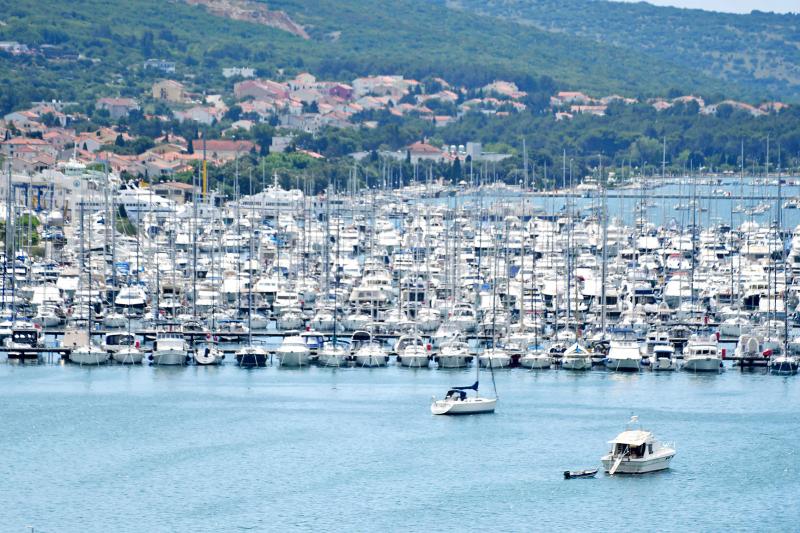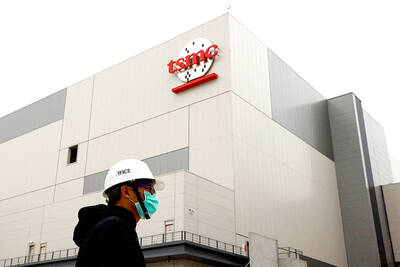Croatia is touting boating and camping on its azure 1,800km Adriatic coastline to woo back visitors and revive its coronavirus-battered tourism sector. After travel restrictions across the EU were relaxed earlier this month, foreigners are now slowly returning as tourism operators try to salvage the season.
Boats and tents might be the cure, offering travelers built-in social distancing as they relax on the idyllic picture postcard coast.
“Alone in a bay on your boat, there is no better distancing,” said Zeljko Cvetkovic, who owns a boat charter company on the northern island of Krk.

Photo: AFP
“Camping is similar,” he adds.
The two sectors have traditionally accounted for an important, but smaller slice of the tourism pie, which accounts for about one-fifth of Croatia’s GDP.
Its tourism industry is expected to contract by 70 percent due to the pandemic.
The economic pain would be the first challenge of the new government to be elected in on Sunday next week.
As the polls approach, Croatian Prime Minister Andrej Plenkovic is hoping to capitalize on his government’s relative success in combating the virus so far. With 107 deaths and 2,539 known infections in a population of 4.2 million, a fragile sense of normality is returning as borders reopen to the main markets, including Austria, Germany and Slovenia.
On the island of Krk, tourism operators, such as Cvetkovic, are finally seeing bookings replace cancelations, sparking hope that he can achieve up to half of last year’s figures.
After months, the Marina Punat was coming back to life, with sailors cleaning their boats and sunbathing on the decks.
Home to about 1,000 islands and islets, Croatia is a dream destination for those looking to island-hop, seek out secluded bays or sail from one restaurant to another to taste fresh seafood.
“Peace and silence,” is how Manfred Schwarz, 59, summed up his week on the sea with four other Austrian friends.
“At most places we were alone or there were only a few other boats,” his friend Johann Wagner, 61, added.
Some of their initial fears from catching COVID-19 have vanished after seeing the lack of crowds. The men were also only a six-hour drive from home.
Croatia hopes this proximity of its main markets, accessible by car in a few hours, will be another draw for tourists weary of airline travel.
“Despite initial pessimism ... our expectations are slowly growing,” said Renata Marevic, who oversees Marina Punat.
Guests were also gradually filling the nearby five-star Krk Premium Camping Resort, which opened late last month.
It is one of the 800 campsites in the country, most of which claim prime real estate on Croatia’s beaches. Many offer visitors various options for their stay, from spaces for tents and camper vans to camping huts or “glamping” tents for a more high-end experience.
In the Krk resort, reminders of the pandemic were visible, but subtle, with signs warning to “Please keep a distance” at the reception, while tables and sun chairs were arranged to ensure the required 1.5m distance.
“We got a recommendation from friends of ours, we looked on the Internet, we tried it and we like it,” said Florian Marchl, 30-year-old who came to Krk with his family from Salzburg, Austria.
“It’s not a problem to keep a distance,” he said, as his wife put their two-month-old son to sleep on the terrace of their luxury bungalow.
Before making a decision, the couple researched how Croatia was dealing with the pandemic.
Guests at the campground are offered online check-in, food delivery, and a round-the-clock health and safety manager ensuring adequate medical services.
The camp, run by leading tourist group Valamar, also limits capacity at 80 percent for safety reasons.
“The advantage is that we are in nature, guests have their private space,” camp manager Bruno Bogdanic said.
Yet experts said that keeping the virus under control is key.
After registering only a few or no cases of the disease daily since the middle of last month, numbers have started to creep up again.
Authorities this week reimposed 14-day quarantines for visitors from neighboring Balkan states, which have logged rising infections rates.
Any new outbreak of COVID-19 “would be a terrible setback that would throw us back to the beginning,” Cvetkovic said.

Stephen Garrett, a 27-year-old graduate student, always thought he would study in China, but first the country’s restrictive COVID-19 policies made it nearly impossible and now he has other concerns. The cost is one deterrent, but Garrett is more worried about restrictions on academic freedom and the personal risk of being stranded in China. He is not alone. Only about 700 American students are studying at Chinese universities, down from a peak of nearly 25,000 a decade ago, while there are nearly 300,000 Chinese students at US schools. Some young Americans are discouraged from investing their time in China by what they see

Taiwan Semiconductor Manufacturing Co (TSMC, 台積電), the world’s largest contract chipmaker, yesterday reported record sales for the first quarter, which analysts attributed to solid demand for emerging technologies. Consolidated revenue totaled NT$592.64 billion (US$18.51 billion) in the January-to-March period, up 16.5 percent from a year earlier, but down 5.26 percent from the previous quarter, TSMC said in a statement. The first-quarter revenue beat analysts’ average projection of NT$579.5 billion, Bloomberg News reported. That performance lends weight to expectations that the world’s most valuable chipmaker would return to solid growth this year after weathering a post-COVID-19-pandemic cratering of smartphone and computer sales. TSMC is budgeting

MAJOR DROP: CEO Tim Cook, who is visiting Hanoi, pledged the firm was committed to Vietnam after its smartphone shipments declined 9.6% annually in the first quarter Apple Inc yesterday said it would increase spending on suppliers in Vietnam, a key production hub, as CEO Tim Cook arrived in the country for a two-day visit. The iPhone maker announced the news in a statement on its Web site, but gave no details of how much it would spend or where the money would go. Cook is expected to meet programmers, content creators and students during his visit, online newspaper VnExpress reported. The visit comes as US President Joe Biden’s administration seeks to ramp up Vietnam’s role in the global tech supply chain to reduce the US’ dependence on China. Images on

US CONSCULTANT: The US Department of Commerce’s Ursula Burns is a rarely seen US government consultant to be put forward to sit on the board, nominated as an independent director Taiwan Semiconductor Manufacturing Co (TSMC, 台積電), the world’s largest contract chipmaker, yesterday nominated 10 candidates for its new board of directors, including Ursula Burns from the US Department of Commerce. It is rare that TSMC has nominated a US government consultant to sit on its board. Burns was nominated as one of seven independent directors. She is vice chair of the department’s Advisory Council on Supply Chain Competitiveness. Burns is to stand for election at TSMC’s annual shareholders’ meeting on June 4 along with the rest of the candidates. TSMC chairman Mark Liu (劉德音) was not on the list after in December last